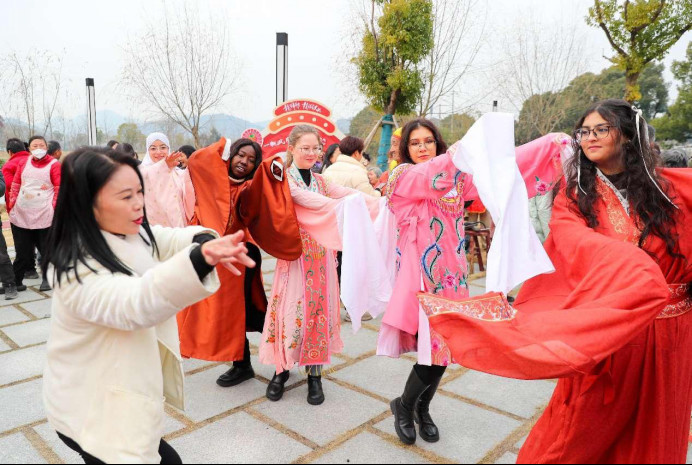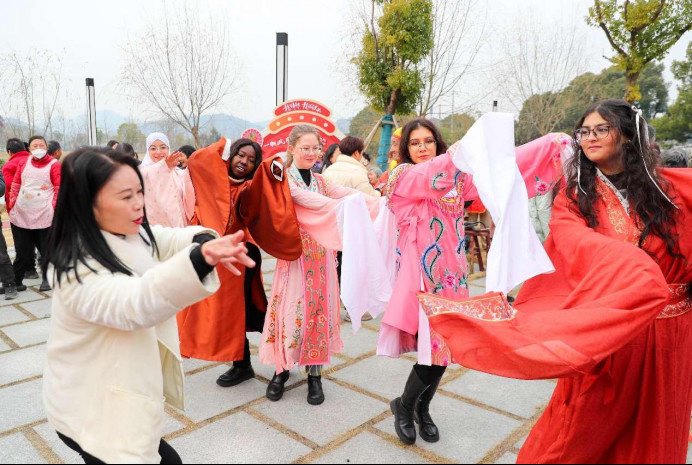By Zhu Jinyi

Foreign students learn Yue Opera in Xinqi village, Deqing county, Huzhou, east China's Zhejiang province, Jan. 27, 2024. (Photo by Cai Jun/People's Daily Online)
As the most important traditional festival of the Chinese nation, the Chinese New Year, also known as the Spring Festival, offers an abundance of customs and rituals, making it a perfect time for a cultural trip.
Dai Bin, president of the China Tourism Academy, estimated that the Spring Festival holiday in 2024 would become a "super golden week," with high enthusiasm for travel and consumption.
China's Ministry of Culture and Tourism recently launched a series of 25 Spring Festival-themed activities, covering seven major categories including popular cultural performances, public service events, intangible cultural heritage experiences, tourism and leisure consumption, winter sports and educational trips, cultural and historical exhibitions, as well as international and domestic celebrations. These activities will offer a wide range of choices for people to celebrate the Chinese New Year and enjoy a joyful holiday.
The museum remains an important destination for offline cultural tours. Statistics show that in 2023, museums across China received a total of 1.24 billion visits, 2.1 times the number in 2022.
During the Spring Festival holiday in 2024, most national museums and provincial museums will continue to be open to the public. In addition to permanent exhibitions, they plan to launch exhibitions themed with the Year of the Dragon and featured exhibitions.
According to an official with China's National Cultural Heritage Administration, more than 400 themed exhibitions have been planned nationwide, including one on the culture of northern Xinjiang and a digital exhibition on cultural relics about Loong collected by the Shaanxi History Museum.
Besides, over 1,000 social education and cultural activities will be hosted, including rubbing experiences and ancient Chinese music performances. These activities aim to offer a cultural feast to the audience.
"Since last year, new trends have emerged in the stage performance market, with many people hitting new destinations to attend art performances," said Zhang Yi, an official with China's Ministry of Culture and Tourism.
During the Spring Festival this year, 10 national art troupes under the direct administration of the Ministry of Culture and Tourism will hold 204 offline performances, including Peking Opera masterpieces, dance drama tours, as well as a musical presented by the China National Theatre for Children.
In addition, Art China and many other online broadcasting platforms will launch special programs for the Chinese New Year, showcasing to the audience the splendid achievements and artistic essence of China's stage arts in the past year.
Apart from enjoying high-quality art performances, during the holiday, people can also watch videos and livestream, and listen to Chinese New Year-themed songs on their mobile phones to experience the festive atmosphere around the world without leaving their homes.
Recently, a livestream event was hosted in Changsha, central China's Hunan province to celebrate the upcoming Chinese New Year. It was organized by the China Association of Performing Arts in collaboration with Douyin, Kuaishou, Tencent Video and other platforms. By setting up dedicated livestream areas, it allowed netizens to experience the joyful and peaceful atmosphere of the Spring Festival in the virtual world.
Various regions in China are leveraging their unique cultural and tourism resources to launch a diverse range of Spring Festival travel products.
Jilin, Liaoning, Xinjiang and other places, in combination with local resources including sports, recreation, hot springs, and folk activities, have hosted colorful events to mark the Chinese New Year, featuring a series of ice and snow-themed tourism products and preferential measures for the public.
Eleven provinces, including Anhui, Jiangxi, Shandong, Hainan, and Sichuan, have launched study tour activities that focus on the natural ecological environment as well as regional cultural characteristics. For example, Sichuan has launched a study tour that introduces the habitats of pandas, while Shandong is also showcasing the charm of traditional Chinese etiquette.
The "Happy Chinese New Year" activities have been held globally for over 20 years, including family day activities held in the U.S., parades on the Trafalgar Square in the UK, temple fairs in Russia and a grand temple fair in Egypt.
As the 2024 Spring Festival approaches, the "Happy Chinese New Year" activities will be organized in nearly 100 countries and regions worldwide, with nearly 500 diverse exchange activities. In around 20 countries such as the Netherlands, Kazakhstan and New Zealand, lantern lighting events will take place, spreading the joy and harmony of the Chinese New Year to the world.
Shi Zeyi, deputy director of the international exchange and cooperation bureau of China's Ministry of Culture and Tourism, noted that during the Spring Festival, various tourism promotion activities will be carried out overseas to encourage domestic enterprises to launch more culturally rich inbound tourism products, and allow more foreign tourists to experience the charm of the Spring Festival in China.
Dai Bin, president of the China Tourism Academy, estimated that the Spring Festival holiday in 2024 would become a "super golden week," with high enthusiasm for travel and consumption.
China's Ministry of Culture and Tourism recently launched a series of 25 Spring Festival-themed activities, covering seven major categories including popular cultural performances, public service events, intangible cultural heritage experiences, tourism and leisure consumption, winter sports and educational trips, cultural and historical exhibitions, as well as international and domestic celebrations. These activities will offer a wide range of choices for people to celebrate the Chinese New Year and enjoy a joyful holiday.
The museum remains an important destination for offline cultural tours. Statistics show that in 2023, museums across China received a total of 1.24 billion visits, 2.1 times the number in 2022.
During the Spring Festival holiday in 2024, most national museums and provincial museums will continue to be open to the public. In addition to permanent exhibitions, they plan to launch exhibitions themed with the Year of the Dragon and featured exhibitions.
According to an official with China's National Cultural Heritage Administration, more than 400 themed exhibitions have been planned nationwide, including one on the culture of northern Xinjiang and a digital exhibition on cultural relics about Loong collected by the Shaanxi History Museum.
Besides, over 1,000 social education and cultural activities will be hosted, including rubbing experiences and ancient Chinese music performances. These activities aim to offer a cultural feast to the audience.
"Since last year, new trends have emerged in the stage performance market, with many people hitting new destinations to attend art performances," said Zhang Yi, an official with China's Ministry of Culture and Tourism.
During the Spring Festival this year, 10 national art troupes under the direct administration of the Ministry of Culture and Tourism will hold 204 offline performances, including Peking Opera masterpieces, dance drama tours, as well as a musical presented by the China National Theatre for Children.
In addition, Art China and many other online broadcasting platforms will launch special programs for the Chinese New Year, showcasing to the audience the splendid achievements and artistic essence of China's stage arts in the past year.
Apart from enjoying high-quality art performances, during the holiday, people can also watch videos and livestream, and listen to Chinese New Year-themed songs on their mobile phones to experience the festive atmosphere around the world without leaving their homes.
Recently, a livestream event was hosted in Changsha, central China's Hunan province to celebrate the upcoming Chinese New Year. It was organized by the China Association of Performing Arts in collaboration with Douyin, Kuaishou, Tencent Video and other platforms. By setting up dedicated livestream areas, it allowed netizens to experience the joyful and peaceful atmosphere of the Spring Festival in the virtual world.
Various regions in China are leveraging their unique cultural and tourism resources to launch a diverse range of Spring Festival travel products.
Jilin, Liaoning, Xinjiang and other places, in combination with local resources including sports, recreation, hot springs, and folk activities, have hosted colorful events to mark the Chinese New Year, featuring a series of ice and snow-themed tourism products and preferential measures for the public.
Eleven provinces, including Anhui, Jiangxi, Shandong, Hainan, and Sichuan, have launched study tour activities that focus on the natural ecological environment as well as regional cultural characteristics. For example, Sichuan has launched a study tour that introduces the habitats of pandas, while Shandong is also showcasing the charm of traditional Chinese etiquette.
The "Happy Chinese New Year" activities have been held globally for over 20 years, including family day activities held in the U.S., parades on the Trafalgar Square in the UK, temple fairs in Russia and a grand temple fair in Egypt.
As the 2024 Spring Festival approaches, the "Happy Chinese New Year" activities will be organized in nearly 100 countries and regions worldwide, with nearly 500 diverse exchange activities. In around 20 countries such as the Netherlands, Kazakhstan and New Zealand, lantern lighting events will take place, spreading the joy and harmony of the Chinese New Year to the world.
Shi Zeyi, deputy director of the international exchange and cooperation bureau of China's Ministry of Culture and Tourism, noted that during the Spring Festival, various tourism promotion activities will be carried out overseas to encourage domestic enterprises to launch more culturally rich inbound tourism products, and allow more foreign tourists to experience the charm of the Spring Festival in China.
 Menu
Menu
 China sees emerging forms of Spring Festival trips
China sees emerging forms of Spring Festival trips
















